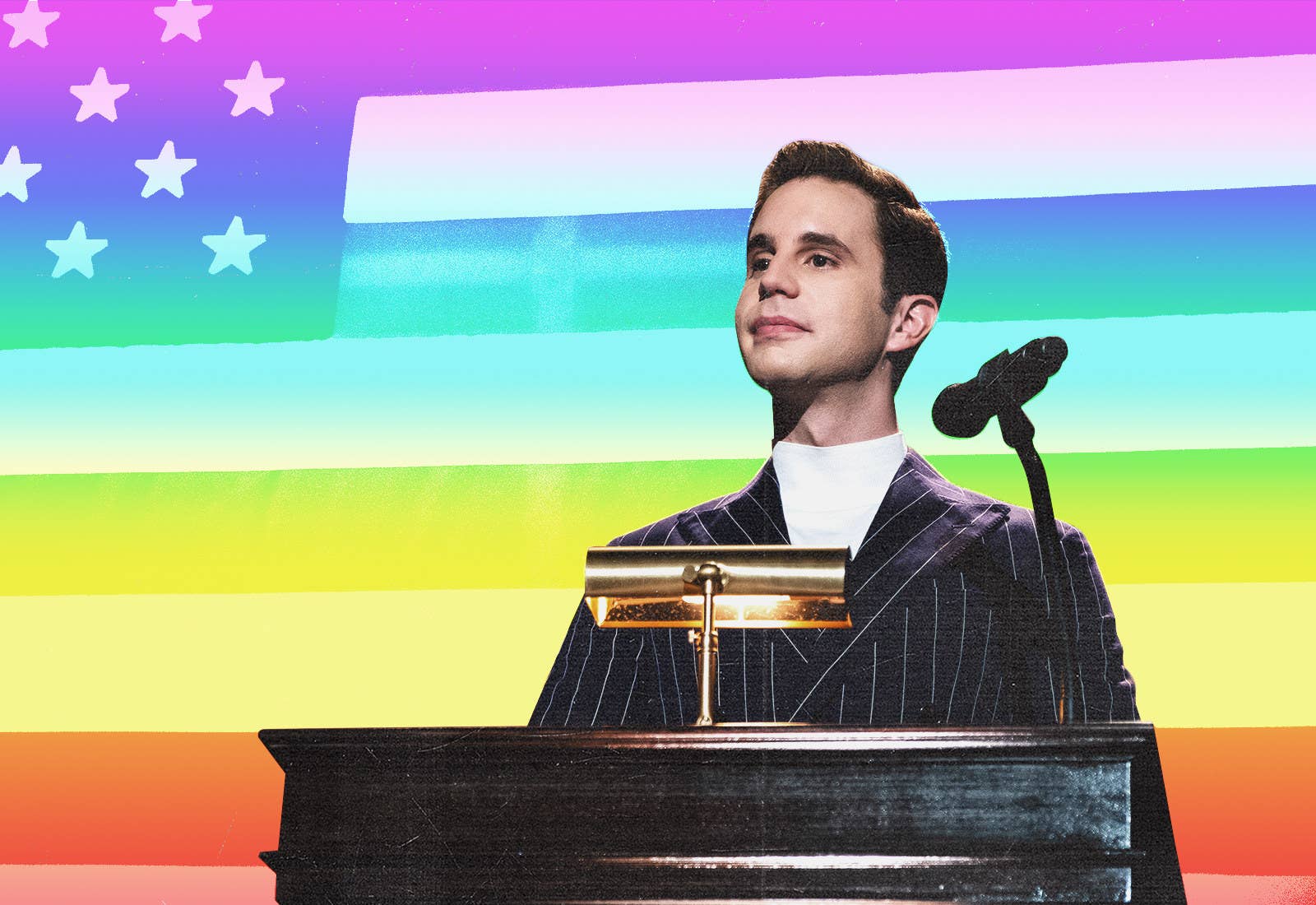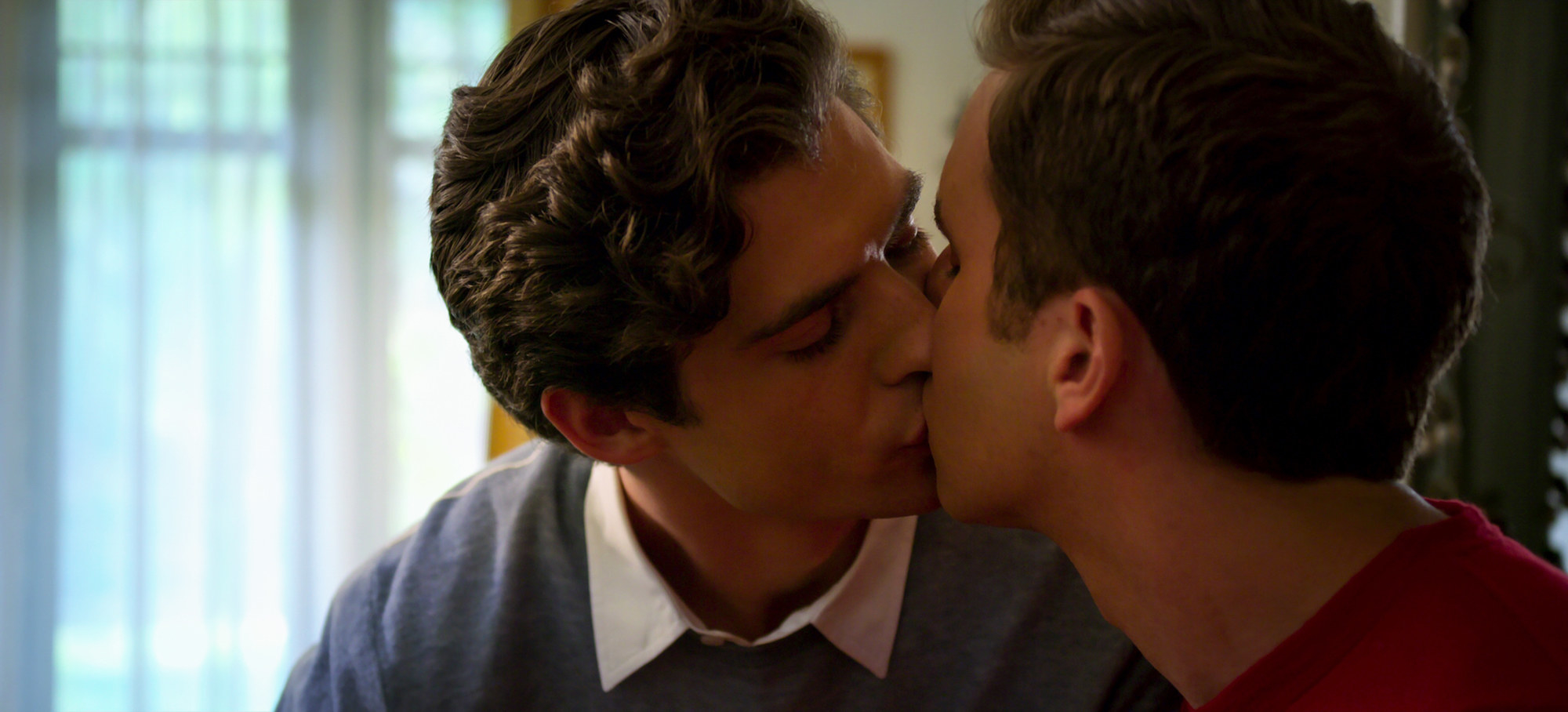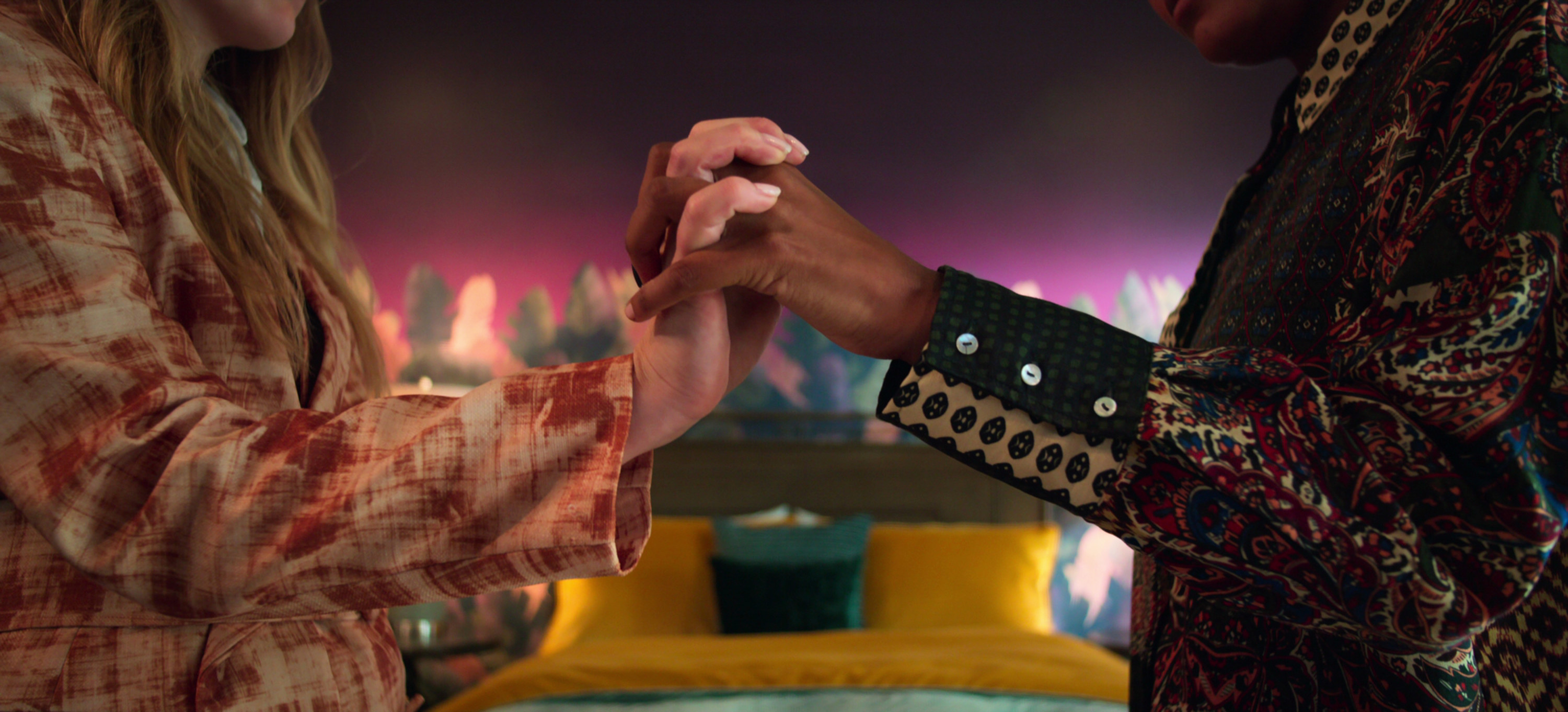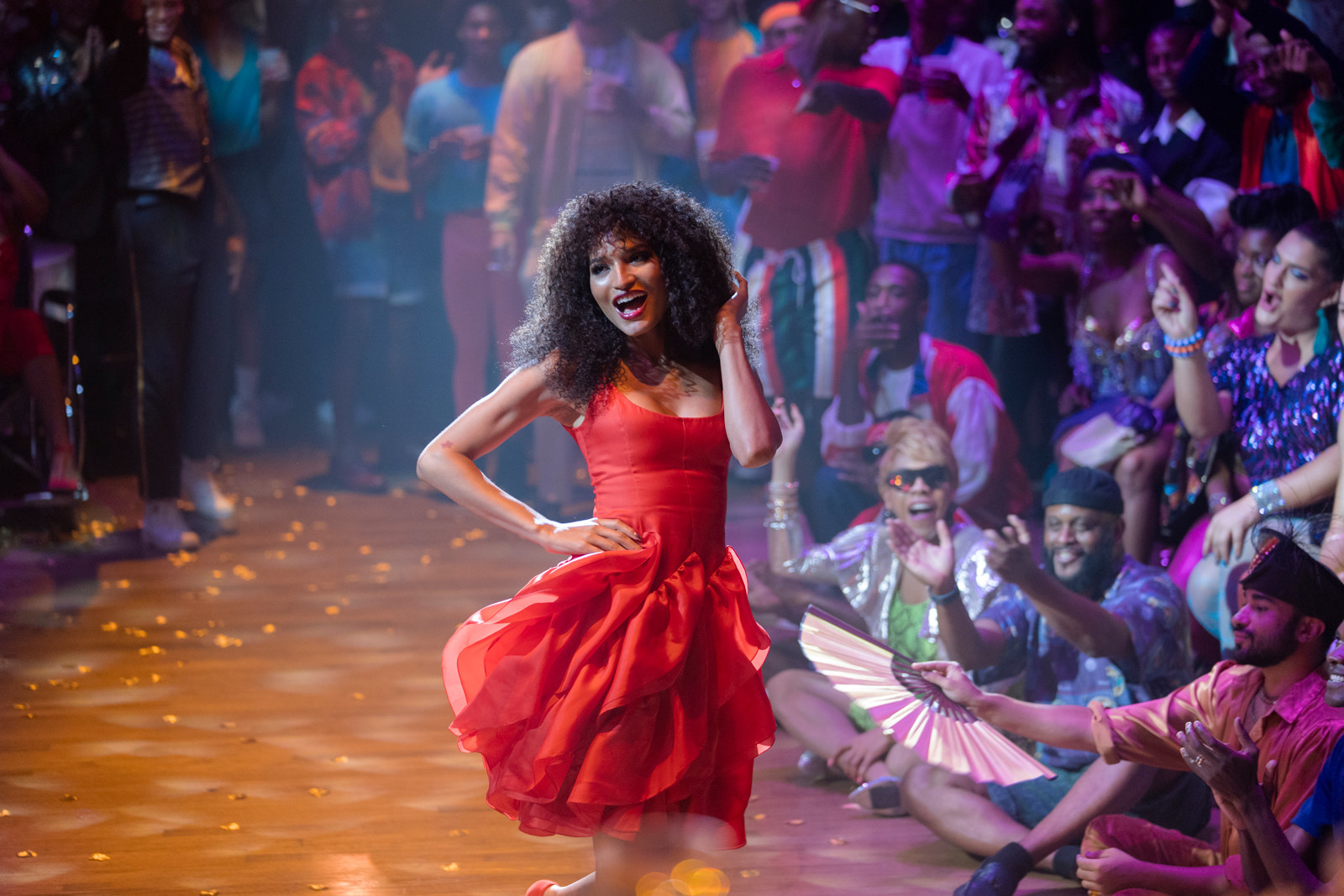
“Payton's possibly a homosexual,” says Astrid Sloan (Lucy Boynton) during a particularly heated moment opposite Payton Hobart (Ben Platt) in the new Netflix series The Politician. The two characters are practically shouting at one another in what turns out to be an unsuccessful attempt at winning over one undecided voter as they each campaign for student body president.
“He had sex with me and my boyfriend,” Astrid blurts out. “He seemed more interested in my boyfriend than me!”
Platt’s character, who is equally riled up, cuts in: “Okay, that was your idea! And if you wanna make this race into a referendum on sexual fluidity, you're gonna lose.”
The student caught between the pair barely reacts to either of them.
Payton, a tenacious student who believes he’s destined to be US president someday, then calls Astrid “a raging bigot who's very uncomfortable with her own bicuriosity.”
If The Politician were released a decade or two ago, the main character likely would’ve swatted away assumptions about their sexuality. But what’s surprising and welcome in Ryan Murphy’s latest series is that most characters are queer without it being a focal point — and without it being a trait that defines their whole character.
As a creator, Murphy has always included LGBTQ characters and odes to queer culture in his shows. But in The Politician, these distinctive traits of his work — which he’s been gradually building and improving upon over the years, with both hits and misses — coalesce in a way that feels very normal in 2019.
“I think it’s really important that Ryan has portrayed this Utopian society that hopefully we’re headed towards,” Platt last month told Pink News, an LGBTQ outlet, “where everybody falls somewhere along the spectrum of sexuality, everyone’s a little bit queer, and no one feels the need to discuss it or label it.”
On set, even the actors found Murphy’s laissez-faire attitude toward sexuality both surprising and refreshing. Theo Germaine, who plays Payton’s campaign manager, James, told BuzzFeed News of a conversation they had with Janet Mock, the trans creative star who directed one of the episodes.
“I went to her and I was like, ‘Hey, is it weird that like, nobody's talking about James being trans? That's kind of weird, right?” Germaine recalled. “And she was like, ‘No, I think it's great. Just run with it. You don't have to say anything about it.’”
Germaine said prior to filming they were told their character’s gender identity and that the character’s parents were supportive, even though it didn’t come up in the show. The direction from Mock made it a relief for Germaine to simply act as “a cunning little high school student who has very big goals.”

As Murphy told the New Yorker in 2018, every decision he makes regarding his art is a deliberate choice. Tracing the steps of the man who some might consider to be the most influential showrunner in all of television — his unprecedented $300 million five-year Netflix deal is a testament to his power — shows how queerness has always permeated his work, albeit in ways that have evolved and been refined over the years.
"I think the great thing about our show is that every year we push the boundaries of what television does,” Murphy told the Hollywood Reporter in 2005. At the time, the creator was riding high off the success of his plastic surgery drama Nip/Tuck. The series, which starred actors Dylan Walsh and Julian McMahon as cosmetic surgeons who began every meeting with the phrase, “Tell us what you don’t like about yourself,” was Murphy’s second stab at showrunning after his first effort, Popular, flopped.
For a show that made its debut in 2003, a time when there weren’t a lot of queer people highlighted in mainstream television, Nip/Tuck set itself apart in ways that weren’t always celebrated in the LGBTQ community. Liz Cruz (Roma Maffia), the prominently featured lesbian anesthesiologist, worked alongside Walsh and McMahon’s Sean McNamara and Christian Troy. Liz’s sexuality was often mocked by Christian, and the fact that they slept together later in the series was troublesome for certain viewers considering how some people think same-sex attraction between women isn’t genuine — or is only valuable when serving the desires of straight men.
The show also drew criticism for its trans storylines which, while groundbreaking, were also deemed incredibly insensitive. The characters Cherry Peck (Willam Belli, a drag queen who would later gain notoriety on RuPaul’s Drag Race) and Ava Moore (Famke Janssen of the X-Men series) were both played by cisgender performers and included troubling storylines. Cherry’s genitalia is mutilated in one scene, though not shown, and Ava is presented as a duplicitous and deviant figure who is accused of having an incestuous relationship with her son.
Just as Nip/Tuck was cooling down, Murphy debuted Glee in May 2009, which came rolling into the public consciousness just as the nation was still under the spell of hope and change ushered in with the election of President Barack Obama. Glee was an endlessly bright and effervescent show where students who felt like outcasts sang their hearts out, unapologetically putting their differences on display and reclaiming them as their strengths. Teen audiences were thrilled to have an onscreen queer couples to root for: Blaine Anderson (Darren Criss) and Kurt Hummel (Chris Colfer), and cheerleaders Santana Lopez (Naya Rivera) and Brittany Pierce (Heather Morris). In 2012, during the show’s third season, Murphy introduced Unique Adams (Alex Newell), a black trans woman character with an out-of-this-world singing voice — a full year before Laverne Cox’s Sophia Burset would burst onto the scene as the most prominent transgender chracter on TV thanks to Netflix’s hit Orange Is The New Black.
Murphy continued striking while the iron was hot, introducing the still-running American Horror Story anthology series just two years after Glee premiered. But just as Glee often lacked subtlety with its messaging, the queer characters on AHS were often tortured or brutalized in very explicit ways. In Season 1, a gay man’s anus was impaled with a fireplace poker. And in Season 5, a heroin-addicted man named Gabriel (Max Greenfield) was “gay raped” by a demon wielding a spiked dildo.
AHS fluctuated with its representations of queerness on screen. While Lana Winters (Sarah Paulson), a lesbian working as a journalist in the 1960s, was subjected to conversion therapy and sexual assault in Season 2’s Asylum, she would ultimately go on to have a heroic ending, killing both major villains that season. Season 7’s Cult featured Ivy Mayfair-Richards (Alison Pill) as the wife of Paulson’s Ally Mayfair-Richards, and one of the major twists of the season centered around Ivy being closely connected with the local cult that had been terrorizing Ally (Ivy never forgave Ally for voting for Jill Stein in the high-stakes 2016 election). The revelation was classic Murphy kookiness presented in a way that wasn’t a harmful stereotype, showing queer people can be villainous without being reductive about sexuality.

Queerness has always been embedded in Murphy’s shows, but The Politician is one of the showrunner’s more recent creative endeavors that actually feels grounded in reality, which is especially surprising considering the show is audaciously satirical.
While The Politician doesn’t make a big deal about queerness, it still revels in the excitement and freedom of it. Platt’s Payton has a romantic relationship with River Barkley (David Corenswet) and Alice Charles (Julia Schlaepfer). Each of these relationships is tender and thrilling both for Payton and for viewers. But questioning the simultaneous feelings he has for people of different genders doesn’t keep Payton up at night. He’s far more concerned with his political aspirations than what people think about what he does in the bedroom.
This introduction of queer characters with little hubbub continues throughout the series. Laura Dreyfuss’s McAfee Westbrook, who does not explicitly express her sexual orientation in the series, has a passionate moment with the gender non-conforming lesbian character Skye Leighton (Rahne Jones) at the end of Episode 4, “Gone Girl.” The moment isn’t telegraphed or explained with context. It just happens.

In a show that’s rife with infidelity, the audience might make a moral judgment on a character who steps out of their relationship, but not who they cheat on their partner with. In one storyline, Gwyneth Paltrow’s character, Payton’s mom Georgina, has an affair with her horse trainer Brigitte (lesbian tennis icon Martina Navratilova). The fact that she’s unfaithful is condemned by her husband Keaton (Bob Balaban), but he doesn’t view her decision to be with a woman as perverse.
Just as Payton was exploring his sexual interests, his girlfriend Alice was doing the same. In Episode 3, “October Surprise,” Payton walks in on Alice and Germaine’s character, James, in bed together. “Why are you here? You’re not supposed to be here,” James says to Payton, startled by his intrusion. Alice doesn’t say anything, only looking at her boyfriend with guilt on her face.
“Don’t. I understand,” Payton says to them both, which is true because he actually does get it. While it may be shocking for Payton to see two friends together, it’s not alarming for him to see a transmasculine person and a cisgender woman together. It’s just real life.

The considerable growth Murphy has exhibited with The Politician in its representation of queerness may have been personal. The creator himself said last year that he’s “not interested in shock value anymore” as a form of entertainment. “I’ve gotten away from sexuality and violence and how far I can push the envelope,” he said. “I’m interested in a different thing now.”
It seems that working with creators from underrepresented backgrounds has enriched Murphy’s work and helped shape his new point of view. With the Half initiative, Murphy has vowed to “make Hollywood more inclusive by creating equal opportunities for women and minorities behind the camera.” He’s also served as an executive producer on FX’s Pose, a period drama following black and brown LGBTQ characters at the height of the AIDS epidemic in New York. What’s even more unique about the drama is that it has included five transgender actors as series regulars, a history-making achievement. The show employs black and brown queer people to tell the stories that affected their community, and its authenticity has led to it being a critical darling, as well as racking up Emmy wins and Golden Globe nominations.
Since becoming a leading showrunner in an industry where queer creators have a difficult time getting ahead, Murphy has attempted to correct his past mistakes by empowering the most marginalized of his community. "I just want more trans stories and I want more LGBTQ stories to be told,” Murphy told the Hollywood Reporter last summer. “What I say to everybody on the show is, 'It's wonderful that you're a part of our show, but now you can hopefully get out there and tell your own story.’”
Perhaps the most iconic queer line from The Politician — one that instantly found a home in meme culture when it appeared in the series trailer — comes not from one of the LGBTQ characters, but from Jessica Lange. The veteran actor plays a villanous grandmother who poisons her granddaughter, Infinity Jackson (Zoey Deutch), in order to elicit public attention, pity, and free gifts.
“I honestly don't understand why calling that gay man a ‘buttmunch’ was such a scandal,” Lange’s character, Dusty Jackson, says to her granddaughter as they dine on free pasta. “I mean, whatever floats your boat. That's what gays do: munch butts and celebrate Halloween!”
Lange, the two-time Oscar-winning actor whose career found new energy on television after appearing in AHS, told BuzzFeed News at a press panel that queer pop culture is “built-in from the get-go” in Murphy’s work.
But when asked how she felt being touted as a gay icon thanks to her work with Murphy, she replied, “Wasn’t I before? I’ve think I’ve always been a gay icon.” ●

